Got a Question?
Complete our short form for a prompt response and world class tax advice.
Yes please contact me regarding mortgages
By selecting this, you agree to the Privacy Policy .

Sign in to your account
Rya powerboat level 2 certificate - a must for yacht captains.

For a lot of yacht captains, navigating the vast expanse of open waters is more than a skill; it's a calling.
However, their role extends far beyond mere navigation and steering.
The open sea demands proficiency in a myriad of maritime competencies.
This is where the Royal Yachting Association (RYA) Powerboat Level 2 Certificate steps in as a vital asset for every yacht captain.
Beyond being a skipper, this certification opens the gateway to a comprehensive range of practical boating proficiencies that can fundamentally transform your capabilities at the helm, and is needed to advance past the basics of yachting .
It's not just about steering; it's about becoming a captain of enhanced competence and confidence, ready to handle any situation that comes your way.
What is the RYA Powerboat Level 2 Certificate?
Why rya powerboat level 2 certification is important, how to get rya powerboat level 2 certification, how long does rya powerboat level 2 certification take, how much does rya powerboat level 2 certification cost, what job roles does rya powerboat level 2 certification open up.
Yacht captains shoulder the immense responsibility of ensuring the safety and well-being of their vessel and all those who embark upon it.
This encompasses far more than steering a yacht through tranquil waters; it involves the mastery of a diverse array of maritime skills.
The RYA Powerboat Level 2 Certificate is precisely designed to arm you with these essential skills, transforming you into a captain capable of confidently navigating various scenarios that might arise on the open waters.
With this certification, you'll be equipped to adeptly manage challenging situations, whether you're manoeuvring into a bustling marina with finesse or swiftly responding to unforeseen emergencies.
The RYA Powerboat Level 2 Certificate isn't just about bolstering your practical capabilities; it's about instilling in you the competence and readiness to tackle the unexpected and maintain the safety and security of your vessel and its passengers.

The importance of the RYA Powerboat Level 2 Certificate for yacht captains cannot be overstated.
As the commanding figures of vessels, yacht captains bear an enormous responsibility for the safety and well-being of both their craft and its occupants.
However, their role goes beyond merely navigating the seas – it involves having a multifaceted skill set that can swiftly and decisively address a myriad of scenarios that may unfold on the open waters.
The RYA Powerboat Level 2 Certificate is a formidable tool in the captain's toolkit, enriching them with a range of essential proficiencies that transcend the conventional roles of steering and anchoring, and is needed to become a yacht captain .
This certification instils in yacht captains the confidence and aptitude to proficiently manage diverse situations.
Be it the meticulous manoeuvring required when docking in a bustling marina or the swift, composed response demanded by unexpected emergencies, this certificate ensures that yacht captains are well-equipped to navigate such challenges without faltering.
Moreover, the RYA Powerboat Level 2 Certificate bolsters yacht captains' existing capabilities, enabling them to be adaptable and proactive leaders.
By honing skills like close-quarters handling, rescue techniques, and navigation in various conditions, this certification transforms captains into seasoned experts capable of steering their vessels and crews through an array of conditions and complexities.
Acquiring the RYA Powerboat Level 2 Certificate involves a structured process that equips individuals with the comprehensive skill set needed to confidently navigate the waters as a yacht captain.
To embark on this journey, aspiring candidates must engage with a certified RYA training centre, which serves as the gateway to acquiring this coveted credential.
The training course is the cornerstone of the certification journey.
Delivered by experienced and knowledgeable instructors, the course is designed to impart a blend of theoretical knowledge and hands-on practical skills that mirror the challenges yacht captains may encounter while at the helm.
Throughout the course, participants will delve into an array of essential subjects that go beyond mere navigation, including seamanship, safety procedures, and practical boat handling.
During the practical training phase, participants gain invaluable experience by actively manoeuvring powerboats in diverse conditions and scenarios.
From perfecting docking techniques to mastering boat control, this immersive aspect of the training allows candidates to bridge the gap between theory and real-world application.
Understanding the intricacies of navigation is crucial not only for safe travels but also for efficient route planning and decision-making in different situations.
Participants in the RYA Powerboat Level 2 training delve into safety training that encompass everything from emergency procedures and proper use of safety equipment to effective communication protocols when dealing with potential risks on the water.
Integral to the certification process is the assessment phase, which evaluates candidates' skills, knowledge, and overall preparedness.
This evaluation typically takes place at the conclusion of the training course and encompasses both practical and theoretical components.
Successful completion of this assessment is a significant milestone on the path to achieving the RYA Powerboat Level 2 certificate.
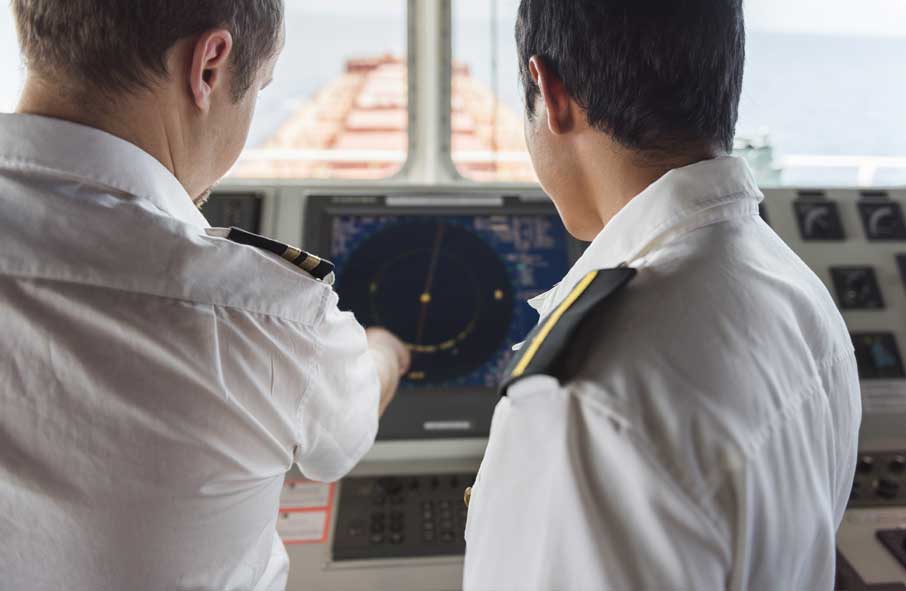
The timeline to attain the RYA Powerboat Level 2 Certificate is a consideration that often aligns with the demanding schedules of yacht captains and maritime professionals.
This certificate can be achieved within a relatively short span, making it an accessible and feasible endeavour for those in the industry.
The duration of the RYA Powerboat Level 2 course may vary slightly based on factors such as the specific training centre and the structure of the program.
However, a general overview reveals that the course is typically designed to be completed over a concise timeframe.
Most training centres offer a streamlined curriculum that condenses essential theoretical knowledge and hands-on practical skills into a well-structured course.
On average, candidates can expect to invest around two to three days of training to earn the RYA Powerboat Level 2 Certificate.
These compact sessions efficiently cover both the theoretical and practical aspects of the course.
This well-balanced approach ensures that participants not only gain a solid understanding of critical concepts related to boat handling, navigation, and safety but also have ample opportunity to apply this knowledge in real-life scenarios.
In general, prices for this certificate can vary depending on many factors, however on average it can cost between £200 and £350 .
When considering the cost of the RYA Powerboat Level 2 Certificate, it's important to recognise that the value it offers extends far beyond the financial aspect.
This certification opens a gateway to enhanced skills, improved competency, and heightened safety awareness in the maritime domain, making it an investment that holds profound significance for yacht captains and maritime professionals.
Training centres situated in different regions may have varying fee structures, and this can impact the overall cost of the course.
Additionally, the specific facilities, resources, the season, and the expertise of instructors provided by each training centre can influence the pricing.
It's advisable to conduct thorough research and explore different training centres to compare costs and assess the value they offer.
While prices may differ, prospective participants should bear in mind that the RYA Powerboat Level 2 Certificate is not just a financial transaction; it's an investment in one's professional growth and expertise, and when compared to how much a yacht captain can make, it is a wise investment.
On top of improving your own skillset and yacht captain earnings, there is also increased tax free income opportunities getting qualified presents as a yacht captain working at sea.
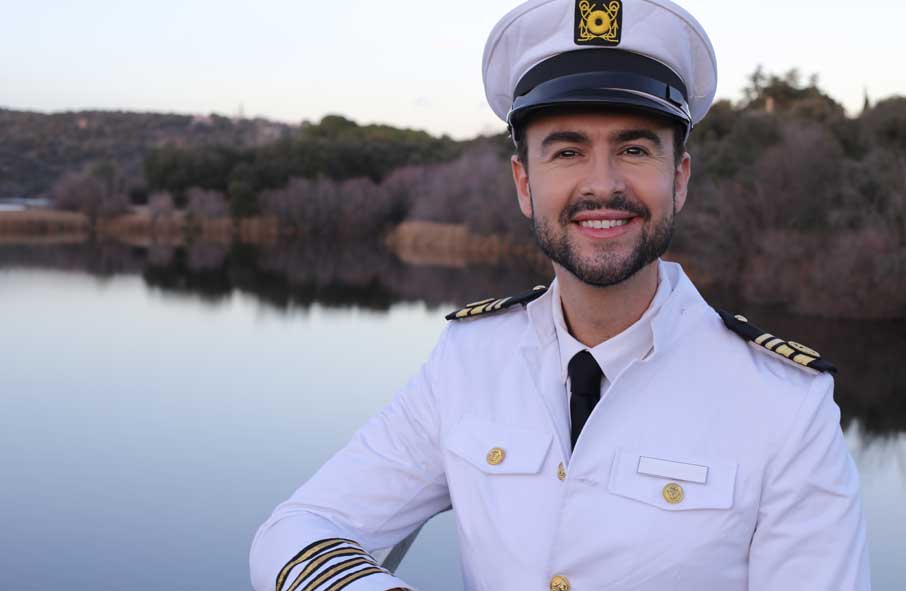
The RYA Powerboat Level 2 Certificate is more than just a credential; it acts as a key that can unlock a diverse array of careers in yachting and the maritime industry as a whole.
Beyond the realm of yacht captains, this certification paves the way for individuals to explore various roles and avenues, each contributing to the vibrant tapestry of maritime professions.
One notable avenue that the RYA Powerboat Level 2 Certificate opens up is powerboat instruction.
Armed with this qualification, you can delve into the world of teaching and training aspiring powerboat operators.
Your proficiency in handling powerboats and your familiarity with safety protocols can position you as an effective instructor, sharing your knowledge with individuals eager to learn the ropes of power-boating.
Additionally, the certificate can serve as a stepping stone to marine tourism roles.
With the ever-increasing popularity of marine-based tourism activities, such as snorkelling trips, sightseeing tours, and water-based adventures, your skills as a certified powerboat operator can be in high demand.
Your ability to navigate safely and efficiently can contribute to enhancing the experience of tourists and travellers while ensuring their safety on the water.
The realm of rescue services also presents an avenue for those holding the RYA Powerboat Level 2 Certificate.
Your expertise in operating powerboats can be a valuable asset in search and rescue missions, disaster relief efforts, and maritime emergency services.
Your proficiency in handling boats can play a pivotal role in swift and efficient response during critical situations, potentially making a life-saving impact.
Furthermore, possessing the RYA Powerboat Level 2 Certificate can open doors to roles in marina management and boat rental services.
Your skills can be particularly valuable in ensuring the safe and proper operation of rental boats, contributing to customer satisfaction and the smooth running of marina operations.
The versatility of this qualification cannot be overstated - it extends beyond the boundaries of a single job title, offering a passport to explore a range of maritime career paths.
The skills you acquire through this certification can be applied across various sectors, making you a valuable asset in any context that involves powerboat operation and safety.
Navigating the open waters demands more than just steering a yacht.
The RYA Powerboat Level 2 Certificate equips yacht captains with practical skills that enhance their effectiveness, safety, and credibility.
By undergoing this training, you're investing in your competency and ensuring the well-being of your crew and passengers. It's a must-have credential that can open doors to diverse career opportunities in the maritime world.
So, if you're a yacht captain looking to up your game, the RYA Powerboat Level 2 Certificate is the course to set your course for success.
For more info on tax deductibles available to a yacht captain whilst working at sea, check out our tax returns section .
If you have questions about a career in yachting, we want to hear from you.
Simply get in touch with us today or let us know your thoughts in the comments section below.
Disclaimer: Any advice in this publication is not intended or written by Marine Accounts to be used by a client or entity for the purpose of (i) avoiding penalties that may be imposed on any taxpayer or (ii) promoting, marketing or recommending to another party matters herein.
Before you go...
You're about to visit a page on our legacy site. We're currently in the process of updating all our tax tools and while this page is still active please return to the main Marine Accounts site after completition.
Refer a friend and receive £50!
Upon successful completion of the referral the cash will be transferred to you.
- Tackling RYA Level 2 Powerboat Handling
Tackling RYA Powerboat Level 2 Powerboat Handling
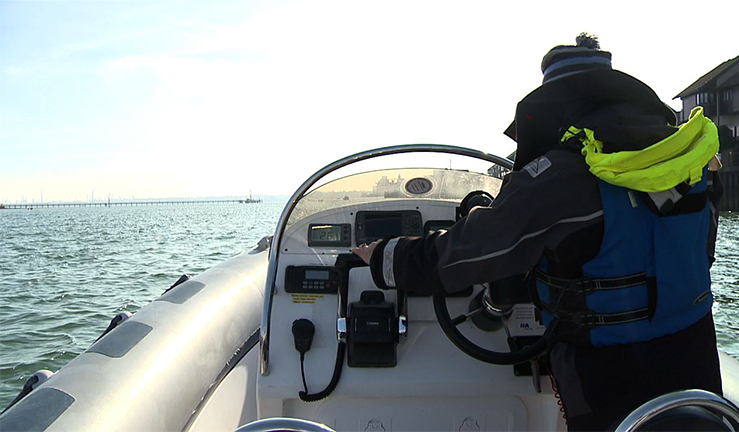
RYA Senior Communications Officer and Editor of InBrief, Emma Slater, shares her experience of the RYA Powerboat Level 2 course ...
I don’t profess to be an amazing sailor but I have completed a few courses and have some sea miles under my belt. However, when it comes to power boating I’m a complete novice. Working for the RYA's communications team, I’m often out in RIBs working with the RYA’s video producer, interviewing boaters and taking photos - and have watched and admired the skill of our RIB drivers as they whizz around race courses keeping ahead of the action, manoeuvre effortlessly in to what sometimes appear to be the tiniest of gaps and gently apply the throttle for a smooth ride.
After numerous outings holding on at the back I decided it was time I got my hands on the throttle, so, along with my colleagues James and Chris, I signed up to tackle the RYA Powerboat Level 2 course and get some skills of my own.
Hear how James, Chris and I got on when we visited one of our local training centres, Southampton Water Activity Centre (SWAC) in Southampton, where our instructor Jon Kirby put us through our paces and honed our skills to claim our PB Level 2 certificates.
Why did you want to take the course?
Chris: It’s a course that I have wanted to do for a while as a sailor with access to RIBs, as it gives you an understanding of using powerboats but more importantly, for me, access to an ICC .
Emma: I wanted to take the course so that when I’m out on the water doing interviews if I needed to take control of the boat I would know what to do. Also I think it’s a really useful skill to have.
James: As the RYA’s video producer I’m often out in RIBs so I needed to know how to drive one in case of an emergency.
What expectations did you have for the course? What did you think it would involve? Anything you were concerned about before doing it?
Emma: I was hoping that we would have lots of time actually doing the skills. I knew there would be classroom elements to the course but I am a practical person and learn best by doing. My biggest concern was the possibility of me doing something wrong and crashing the boat!
Chris: Truthfully I wasn’t expecting so much hands-on experience. I was expecting a fair amount of it to be classroom based, so was surprised at the amount of time we had in the boats. I knew the course was about boat handling skills and safety, as I have friends that have done the course. The only concern was how cold the weather was going to be!
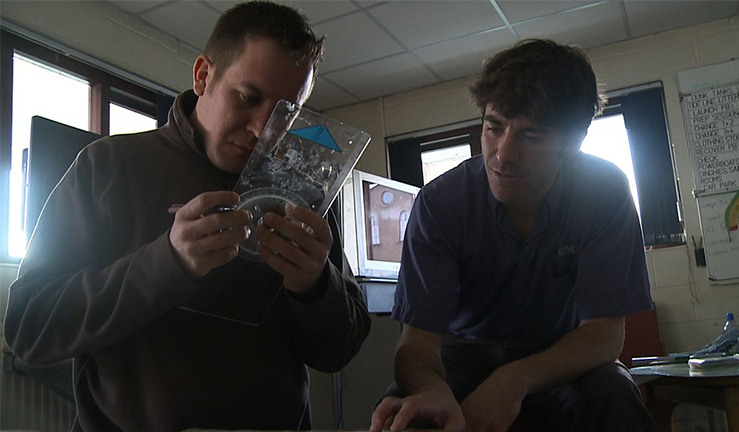
Chris (left) in the classroom
Can you talk us through what you did on the course?
Chris: The course I did at SWAC was a 2 day course. Firstly we were introduced to the RIB. We were shown around all areas of the RIB explaining what things were and what they did, but most importantly the kill cord and grab bag. After this is we talked through and then launched the RIB from a trailer. It was then out on the water where we did some basic manoeuvres so we knew how the boat would handle, figure of 8’s forwards and backwards etc. Then it was in to the classroom to talk about weather and first aid. From here it was back out on the boat to do some tight space handling, followed by some slow speed approaches to a mooring buoy. We also discussed ColRegs in the class room and when we were on the water.
On the second day we were using a bigger RIB with twin engines. To start the day, as a group we did some navigation work, planning where we were going and the length of time it would take. We were then off to the RIB, where we started with some slow speed handling in confined spaces to get used to how this bigger RIB handled. It was then time to fuel up which involved tackling a lock. From here we started our passage plan and did some high-speed turns. The emphasis here was about the whole boat communicating and being part of what we were doing. After lunch we did the return passage, when we did a lot of man-over-board practice. We finished our time on the water with some final coming alongside practice and close quarters handling. It was then back to the classroom for a bit of rope work.
Emma: As you can see from Chris’s account it was a pretty full on two days but great fun. Our instructor was excellent at answering any questions or concerns we had and giving us all plenty of time to really get to grips with what we were learning. One thing I did find surprising was when we launched the RIB for the first time how easy it was to push the trailer with the RIB on it and manoeuvre it to the water, easily managing to do it on my own!
James: I was pleased that before we did anything we had a briefing with our instructor so he could establish what level of experience we all had.
What part of the course did you enjoy the most?
James: I loved that the course was very practical and even when you’re not driving the boat you are always busy helping the driver and learning from the instructor.
Chris: I think the most enjoyable part was all of the boat handing I did. It was great to have someone there telling you what you needed to do, but also not being so involved that you weren’t feeling that it was all in your control. Probably the best part is when you complete your first small space manoeuvre.
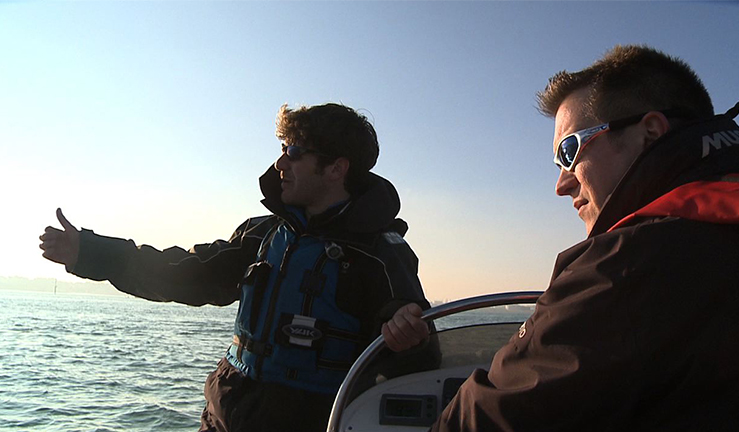
Chris at the throttle
Emma: Much like Chris I really enjoyed the hands-on part of the course, actually taking control of the throttle and making the decisions about how to manoeuvre the boat, park it, and turn it around.

What elements of the course did you find difficult?
Chris: I did have a bit of difficulty doing some of the slower manoeuvres like approaching the buoy, but the more time I spent doing these, the more and more confident I got.
James: The most difficult aspect of the course for me was the rules of road, but John explained it really clearly to me and kept reinforcing what he was telling me when we were on the water which made things much easier to understand.
Was it easier / harder to do than you may have thought?
Emma: Surprisingly I actually found it easier than I thought it was going to be, even when we moved into the larger RIB which did have me quite worried the first time I saw it. But having John close by did help build my confidence.
James: It was easier than I thought. Once you have a basic understanding of piloting the RIB it then becomes more about the rules of the road and how the tide and wind will affect your passage.
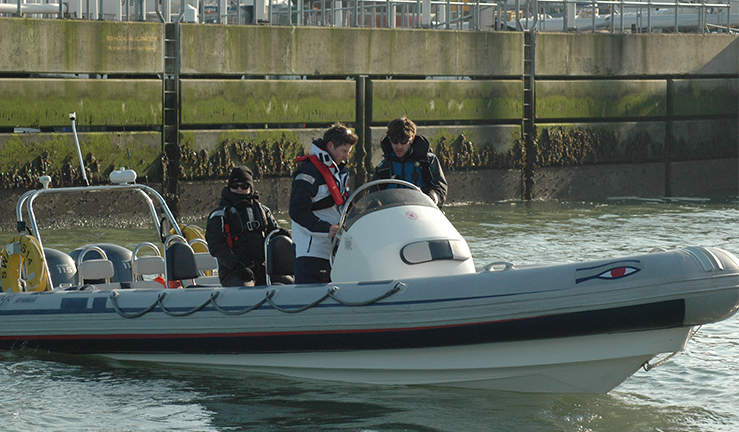
James getting some instruction before we get underway
Chris: I think it was actually harder than I was expecting, some of the slower speed handling was very difficult to start with.
What did you learn from the course?
James: Tons. It was a real eye opener.
Chris: I learnt a lot, the main thing being that you always wear a kill cord, but also some great techniques and skill of boat handling in confined spaces.
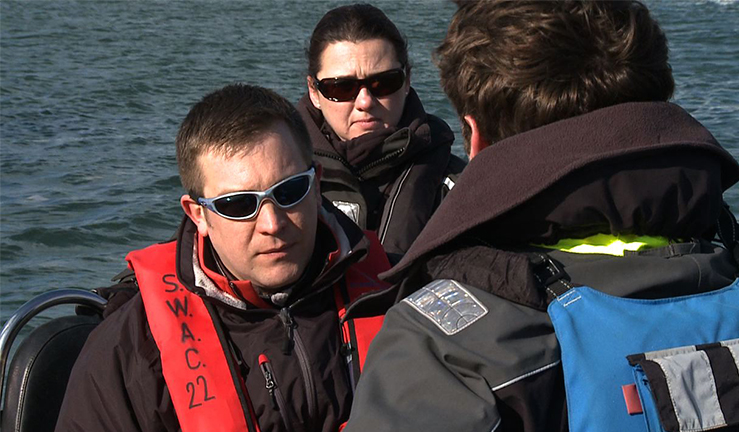
Chris and I listen closely to Jon’s instructions
Emma: I learnt loads, especially the skills needed for manoeuvring in small spaces and bringing the boat alongside and the importance of always wearing a kill cord and communicating with others on board.
Why do you think this is a good course to do?
James: I think anyone that’s thinking about putting themselves at the controls of a RIB needs to go on this course, for their own safety and the safety of their passengers.
Emma: The course gives you a really good appreciation of how important it is to know what you are doing when out on the water and build knowledge and confidence handling your boat.
Chris: It’s a great way for people to learn about using RIBs and powerboats and gain experience and knowledge that will make them safe on the water. I personally think all boat owners should have a qualification like this.
How will you be using the skills your learnt?
Emma: It means that when we have to go interview, film or photograph people on the water I can drive one of the RYA RIBs and not always have to rely on a third party to take us.
Chris: I have gained an ICC so I will hopefully using my PB2 qualification when on honeymoon this year, but mainly, it’s to support the team when they have filming/interviewing duties on the water.
James: The general understanding I have gained from attending the course has given me the basic skills to drive the RIB and what to do in an emergency situation and how to avoid those situations in the first place.
Will you be doing any more PB courses?
Chris: I'm thinking about doing the Advanced or Safety Boat courses next.
What would you say to someone else thinking about taking the course?
Emma: Just do it. You’d be surprised what you can achieve in just two days. The course is full on but loads of fun and you’ll come away with loads of new skills.
Chris: Do it, it’s a lot of fun and a great way to learn something on the water in two days that gives you an internationally accepted qualification.
Want to know more about RYA Powerboat Level 2?
The RYA Level 2 Powerboat Handling course is a two day course that provides the skills and background knowledge need to drive a powerboat and is the basis of the International Certificate of Competence (ICC).
The course includes close quarters handling, high speed manoeuvres, man overboard recovery and collision regulations and can be taken on inland or coastal waters, with your certificate being endorsed accordingly.
Course overview
| None. May be preceded by | |
| 2 days | |
| 12. Candidates under the age of 16 will be issued with an endorsed certificate | |
| Launching and recovery, boat handling, securing to a buoy, anchoring, leaving and coming alongside, man overboard | |
| Self-sufficient powerboater in the right conditions, aware of own limitations and those of the craft |
Our instructor, Jon Kirby from Southampton Watersports Activity Center (SWAC), shares his top tips for powerboat handling.
Find out more about RYA Powerboat Level 2 and other RYA courses at: rya.org.uk/training .

IMAGES
VIDEO